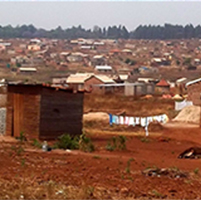Limits to Ecological-based Planning in Zimbabwe. The Case of Harare
Abstract
This paper explores the feasibility of adopting ecological based planning in low-income residential development. It explicates that in developing countries efforts by housing authorities have been on housing provision irrespective of the environmental threats to sustainability. As these houses are built, future of urban ecology is under threat. The questions regarding this phenomenon are several: how do low-income populations perceive environmental issues of urban settlements? How capable and willing are the local authorities to embrace and apply ecological based planning in residential development? What are the facilitating instruments of ecological-based planning? What are the prospects of integrating ecological based planning to low-income residential development? What are the restraining factors towards embracement of ecological based planning and how best can they be harnessed towards future ecological cities? The case study of Hatcliffe residential area in Harare shows that there are many challenges to overcome uncoordinated planning approaches, ineffective policies and legislative frameworks, weak institutional settings, financial constraints, outdated planning standards and regulations, poverty, lack of environmental stewardship and lack of political will among others. The study findings call for robust environmental conservation strategies, strong environmental stewardship, responsive institutional and funding mechanism backed by realistic legislative frameworks and robust policy rectification.Downloads
References
Beer, Anne R; Tim Delshammar, and Peter Schildwacht. "A changing understanding of the role of greenspace in high-density housing - a european perspective." Built Environment, 29(2), 2003: 132 -143.
Beunen, Raoul; Janneke E and Hagens, Wageningen. "The Use of the Concept of Ecological Networks in Nature Conservation Policies and Planning Practices." Landscape Research 34:5, 2009: 563-580
Brand, Partison. "Urban environmentalism: in the twilight between vice and virtue." Urban Design International, 1(4), 1996: 357-360.
Castels, Stephen. Ethnicity and globalisation: from migrant workers to translational citizen, London: Sage Publications, 2000.
Chaeruka, Joel, and Killan Munzwa. Assessing Regulatory Framework Bottlenecks for Low-cost Housing in Zimbabwe. Harare: UN-HABITAT and the Government of Zimbabwe, 2009.
Chenje, Munyaradzi, and Johnson Phyllis. State of the Environment in Southern Africa. Harare: IUCN-The World Conservation Union, 1994.
Chirisa, Innocent, and Muchini, Tawanda. "Youth, Unemployment and Peri-Urbanity in Zimbabwe: a snapshot of lessons from Hatcliffe." International Journal of Politics and Good Governance Volume 2, No 2.2, Quarter II (International Journal of Politics and Good Governance), 2011.
Dirwai, Charles. Demographic Study of a holding camp: The case of Hatcliffe Extension, Zimbabwe. Harare: Unpublished MSc thesis, Centre for Population Studies, University of Zimbabwe, 2000.
Gilbert, Richard; Stevenson Don; Girardet, Hebert; and Stren, Richard. Making cities work: The role of local authorities in the urban environment. London: Earth Scan publications, 1996.
Government of Zimbabwe (GoZ). Statutory Instrument 7 of 2007, Environmental Management Regulations. Harare: Government Printers, 2007.
Government of Zimbabwe. Environmental Management Act (Chapter 20:27). Harare: Government Printers, 2000.
Government of Zimbabwe. The Regional Town and Country Planning Act Chapter 29: 12. Harare: Government Printers, 1996.
Hough, Micheal. City Form and Natural Processes. London: Routledge, 1991.
House of Commons. Enhancing urban green Space: Fifty–eighth Report of Session 2005-06. London: The Stationery Office Limited, 2006.
Madanipour, Ali. Design of Urban Space: An Inquiry into a Socio-Spatial Process. New York: John Wiley and Sons, 1996.
Maphosa, France; Kujinga, Krasposy and Chingarande Sunungurai D. Zimbabwe's Development Experiences Since 1980: Challenges and Prospects for the Future. Addis Ababa: Organisation for Social Science Research in East Africa, 2008.
Mbiba, Beacon. “Beyond Abject Spaces: Enterprising Zimbabwean Disapora in Britian”, Africa Dispora 4 (2011), 50-75.
Muderere, Trymore. "Natural Co-Existence or Confinment:Challenges in integrating Bird Life Concerns into Urban Planning and Design in Zimbabwe." Journal of Sustainable Development in Africa (Volume 13, No.1, 2011) , 2011: 162-183.
O’Riordan, Timothy and Turner Kerry T. An Annoted Reader in Environmental Planning and Management. Oxford: Pergamon Press, 1983.
Pieterse, Edgar. "Recasting Urban Sustainability in the South." Society for International Development 1011-6370/11, 2011: 309–316.
Potts, Deborah. The slowing of sub-Saharan Africa's urbanization: evidence and implications for urban livelihoods. Environment and Urbanization 21(1), 2009: 253–259.
Said, Ilias, Omar Osman, Mohd Wira Mohd Shafiei, Arman Abd Razak, and Tee Kuan Kooi. "Sustainability in the Housing Development Among Construction Industry Players in Malaysia." The Journal of Global Business Management Vol. 5, , 15, 2009.
Simone, Abdou Maliq. “Moving Towards Uncertainty: Migration and the Turbulence of African Urban Life”. Paper prepared for Conference on African Migration in Comparative Perspective, Johannesburg, South Africa, 4-7, June, 2003. URL: http://time.dufe.edu.cn/wencong/africanmigration/2Simone. pdf.
Shu-Yang, Fan, Bill Freedman, and Raymond Cote. "Principles and practice of ecological design." Environ. Rev. Vol 12: , 2004: 97–112.
Termorshuizen, Jolande W, Paul Opdama, and Brink Adri van den. "Incorporating ecological sustainability into landscape planning." Landscape and Urban Planning 79, 2007: 374–384.
Toriro, Percy. “Town Planning in Zimbabwe: History, Challenges and the Urban Renewal Operation Murambatsvina”, Chapter 11 in Maphosa F, K Kujinga and S D Chingarande (eds.) Zimbabwe's Development Experiences since 1980: Challenges and Prospects for the Future, OSSREA: Addis Ababa 2007.

Copyright (c) 2014 Tema. Journal of Land Use, Mobility and Environment

This work is licensed under a Creative Commons Attribution 4.0 International License.
Authors who publish in this journal agree to the following:
1. Authors retain the rights to their work and give in to the journal the right of first publication of the work simultaneously licensed under a Creative Commons License - Attribution that allows others to share the work indicating the authorship and the initial publication in this journal.
2. Authors can adhere to other agreements of non-exclusive license for the distribution of the published version of the work (ex. To deposit it in an institutional repository or to publish it in a monography), provided to indicate that the document was first published in this journal.
3. Authors can distribute their work online (ex. In institutional repositories or in their website) prior to and during the submission process, as it can lead to productive exchanges and it can increase the quotations of the published work (See The Effect of Open Access)
